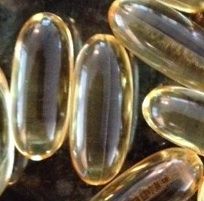
Omega-3
Do Fish and Fish Oils Cause Prostate Cancer?
Is fish and fish oil dangerous to your health, or is this a lot of hype?
Posted August 4, 2013
Since I work with many patients with mood challenges, I often recommend supplemental fish oils. Fish oil has known benefits in improving structure and function of our brain and nervous system. For conditions like anxiety and depression, this can make the difference between whether other treatments work or not, and even whether a person has a reoccurrence after getting better.

Understandably, many of my patients (especially the men) have recently asked me about the media blitz surrounding a new Journal of the Natural Cancer Institute study, which stated that fish oils increase risk of prostate cancer. This study called SELECT (Selenium and Vitamin E Cancer Prevention Trial) reported that higher levels of fish oils in the blood caused a 43% increase in low grade prostate cancer and an alarming 71% increase of high grade cancer (1).
Let’s Look At This Fish Story of An Article
So, I decided to take a look at the research: it’s set-up, methodology, statistical analysis and so on. If this study is a good quality study, I may have needed to change my mind about how I think about fish oil for myself, and my patients.
Having reviewed the article, I was amazed at the glaring problems with the conclusion. Being both an author and reviewer myself for peer reviewed textbooks and journals, I am aware of the stringent process for publishing in a prestigious journal. After reviewing this article, all I can say is it seems whatever standards for publishing in this journal has must have been temporarily relaxed to get this article through.
Here are my concerns:
1 - My first concern is that this study was designed to look at vitamin E and selenium intake. This study did not look at whether the men ate fish or took fish oils, so we have no idea what the intake of fish was for these men. How can we indict fish oils and fish when we don’t even know if the men were taking them?
2 - My second concern is that for a six-year study, the researchers took one lone sample of blood very early in the study to check for levels of fatty acids in the blood (known as plasma phospholipids). Instead of checking multiple times over time, as any valuable research would, this study used one sole time point. As a note, this test only reveals what a person ate in the last few hours, and has no bearing on long term consumption.
3 - When you actually looked at the numbers of these single time points, the men with higher levels of prostate cancer had 4.66 percent blood levels, versus the 4.48 percent for the men who were less likely to have prostate cancer. The authors made a terrific leap by suggesting that this infinitesimally small number was enough to somehow promote cancer. The article also gave no information about how the fish oils could have possibly caused the cancer.
It was noted in the research that 80% of the men with prostate cancer in this study were also obese. Is it possible that this known prostate-cancer promoting factor may have played a role?
I also was able to listen to an interview with the lead author Dr. Theodore Brasky in July when he kindly appeared on the People’s Pharmacy (2). When asked about how we can extrapolate fish oil danger when we don’t know if they ate fish or took supplements, he didn’t have an answer to give the interviewer. He did mention at the end though that he still eats fish.
Conventional Medical Community Response
Ok, I am a naturopathic doctor – and while I try to be as balanced as I can, I will of course be bias in favor of natural medicines. But, for this article, even the conventional medical community, which generally does not favor use of natural supplements, has raised concern about the validity of this study.
Medscape News posted an article by Dr. Gerald Chodak, a urologist and well-known prostate cancer author and expert raised concerns about the study. He said:
The bottom line is that we cannot determine from this study design whether the intake of omega-3 fatty acids will cause prostate cancer and raise a man's risk for high-grade disease.
The media has taken this and sensationalized the risk associated with omega-3 fatty acid intake, but I believe that the attention is overplayed and the concerns about the study design were not mentioned at all. (3)
What Do Other Studies About Fish Oil and Prostate Cancer Say?
As I mentioned, many good quality studies have already examined this issue. A 2010 meta-analysis (a study that looks at numerous studies as a whole) of over 15,000 patients did show that men who ate more fish had a 63% reduction in deaths from prostate cancer. While this particular study did not show a decrease in actual prostate cancer itself, it did show that men who had prostate cancer seemed to do better , and the presence of the fish oil in the diet may actually allow the body to keep the cancer at bay (4).
Another study looked at almost 6300 Swedish men over 30 years. In this group, the men who did not eat any fish had a much higher rate of prostate cancer – a 200 to 300% increase risk versus those who consumed large amounts of dietary fish (5).
A third public health study from Harvard evaluated more than 48,000 people for 12 years. This should that eating fish 3 times a week correlated with a reduction of both prostate cancer, and the ability of prostate cancer to spread. (6)
Interestingly, the protective effect of fish oil applies to other cancers and diseases. A very recent 2013 British Medical Journal meta-analysis of 21 studies of almost one million participants reported that consumption of fish oil and omega 3 fatty acid consumption, produces a significant reduction in the rate of breast cancer occurrence (7). Why didn’t this article receive a media blitz too?
Watch Out for the Sound Byte Nation
When I first read about this in the news of possible fish oil and cancer link, of course I was concerned. It is true that there is much we do not know about natural medicines – so more research is always welcome. But, at the same time, I was suspicious, for this information directly contradicts years of other good quality research about fish oil.
I was suspicious because the media frenzy that accompanies information about health often occurs in quick sound bytes: you get a little bit of sensational information that does not represent the whole picture. This sound byte happening often occurs with natural medicines in both directions: either something is a ‘miracle’ supplement (which is almost always it is not) or the natural supplement will cause disease (which it usually won’t either).
I know we are all very busy – so digested little bits of information given to us can be helpful. Unfortunately, everyone is biased (the media, the scientific community and myself) – so it is up to each person to spend a little extra time reading and thinking about it or looking for a source of balanced information that you can trust. Don’t believe the hype right away – look into it further to make sure it makes sense.
Fish Oil Conclusion
While this research caused a great sensational frenzy, there is no concrete reason at this point to worry about fish oil causing prostate cancers. Given the protective benefits of fish oil and supplements, it still seems just as reasonable to feel safe taking in fish, and taking fish oil. Remember to always look for lower mercury and PCB fishes (like wild salmon) if you are eating fish regularly, and if you are taking a supplement, please assure the company making this supplement is using stringent testing for mercury, contaminants, and freshness of the oils.
If I may add a positive spin to this, one benefit of this research is that it will hopefully spur more good quality studies of fish oil and other natural medicines – and that is a good thing for all of us.
About Dr. Bongiorno: Peter Bongiorno ND, LAc is co-director of Inner Source Health in New York, and author of How Come They're Happy and I'm Not? The complete naturopathic guide to healing depression for good. More about him can be found through www.drpeterbongiorno.com.
References:
1 - Brasky TM et al. Plasma Phospholipid Fatty Acids and Prostate Cancer Risk in the SELECT Trial. J Natl Cancer Inst. 2013 Jul 10.
2 - http://www.peoplespharmacy.com
3 - Chodak G. Fish Oil’s Link To Prostate Cancer Unproven: Medscape News. July 26, 2013 http://www.medscape.com/viewarticle/808402
4 - Szymanski KM et al. Fish consumption and prostate cancer risk: a review and meta-analysis. Am J Clin Nutr. 2010 Nov;92(5):1223-33.
5- Terry P et al. Fatty fish consumption and risk of prostate cancer. Lancet 2001; 357: 1764-6
6 - Augustsson K, et al. A prospective study of intake of fish and marine fatty acids and prostate cancer. Cancer Epidemiol Biomarkers Prev. 2003;12:64-67.
7 - Zheng JS et al. Intake of fish and marine n-3 polyunsaturated fatty acids and risk of breast cancer: meta-analysis of data from 21 independent prospective cohort studies. BMJ. 2013 Jun 27;346



